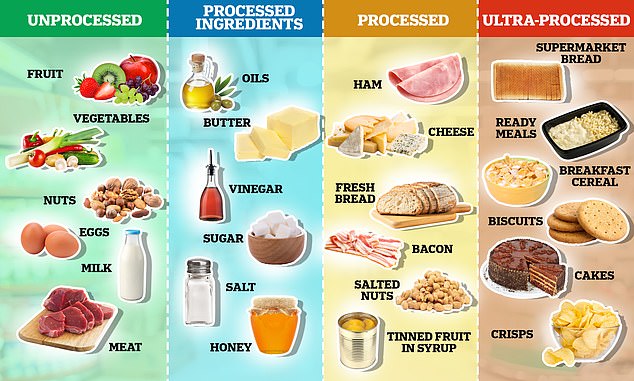One in six British adults say they are addicted to ultra-processed foods, according to new research.
Eating too many convenience foods, sugary cereals, or mass-produced bread has been linked to health problems such as heart disease and some cancers.
These ultra-processed products, which typically do not contain ingredients found in regular home cooking, often lack essential nutrients and are often high in sugar, fat and salt, additives and other added chemicals.
However, most adults report regularly consuming foods that they consider ultra-processed.
Nearly nine in ten said they eat ultra-processed foods (UPF) at least once a week. A quarter said they eat UPF every day.
One in six British adults say they are addicted to ultra-processed foods, according to new research (file image)

These ultra-processed products, which typically do not contain ingredients found in regular home cooking, often lack essential nutrients and are often high in sugar, fat and salt, additives and other added chemicals (file image)

Experts said the survey suggested millions of people were putting themselves at risk of serious health problems (file image)

The Nova system, developed by scientists in Brazil more than a decade ago, divides foods into four groups based on the amount of processing they have gone through. Unprocessed foods include fruits, vegetables, nuts, eggs, and meat. Processed culinary ingredients, which are not typically eaten alone, include oils, butter, sugar, and salt.
Worryingly, 17 percent considered themselves addicts. The findings come from a survey of 5,000 adults by healthy eating platform Lifesum, which also found that a third ate UPF when stressed. Another third enjoyed the convenience.
Experts said the survey suggested millions of people were putting themselves at risk of serious health problems.
Earlier this year, the world’s largest review of UPFs found that they increased the risk of damage to every part of the body when consumed in large quantities.
The study, published in the British Medical Journal, found that diets rich in UPF elements increased the risk of dying from a heart attack or stroke by 50 percent.
People who consumed UPF regularly were also more likely to be obese, as well as suffer from lung diseases and sleep problems.
UPFs are also typically created to be soft and easy to eat, meaning they are more likely to be consumed in larger quantities.
The survey also found that the majority of adults said that consuming UPF negatively affected their mood and reduced their energy levels.
“UPFs are full of things that humans are programmed to seek out: fat, sugar and salt,” says Dr Duane Mellor, from Aston University, Birmingham. ‘But most contain harmfully high levels. “It can be easy for people to adopt a pattern of seeking out these types of foods.”


